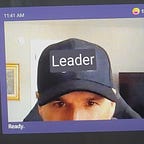The roots of leadership — integrity
The root of self-esteem is integrity.
It is said, that we cannot give what we do not have. If you believe this to be true, then it implies that leaders will struggle to pass on values that they have not made active in their own lives.
We can talk about them, pretend to care about them, even declare them as vitally important, but unconsciously, we know we do not live by our words. And we can be sure that those to whom we are making our declarations share the same impression.
Integrity, in simple terms, is experienced naturally when our actions align with our deeply held values. Our experience of integrity must be guided by how we see ourselves, not how we want to be seen by others. Thus the values we choose must be ours, not imposed upon us. It is important to be clear on this distinction.
If we present a self to the world that doesn’t line up with the self we know to be true, our self-esteem will suffer.
When self-esteem suffers, we act out in an effort to recover cheaply what cannot be obtained without the hard work of integrity. This is where micro-managing, passive-aggressive, and self-centered behaviors are substituted in order to avoid confronting this truth.
Sooner or later this cycle will erode our effectiveness, sometimes to the point where we are forced out due to performance issues or leave on the pretense that the problem is with the organization. We choose deflecting rather than recognizing the source of our issues.
One cannot raise the esteem of others or gain their esteem if one has poor self-esteem.
The enemy of integrity is perfectionism.
The work of building integrity must be grounded in reality. We will never act in ways that perfectly align with our values. Anyone reading this must know this to be true.
If we set unrealistic expectations for ourselves, we are setting ourselves up for resentment, frustration and, in the end, more acting out as we whip ourselves back into shape after any minor failure. Once again our self-esteem suffers and we act out in ways that damage our integrity.
Progress not perfection.
What advice then?
Establish the values by which you want to live and lead. Write them down. Read them often.
Make it your intention to act in accordance with you values in each situation you encounter. Ask yourself, “what do I really want?”
Tune your awareness so that you slow down and observe yourself, the context, and your feelings before you act. Is what you are about to do or say aligned with the person you want to be? Will it lead to the type of outcome you really desire?
When you miss the mark, be honest and vulnerable with yourself and others where appropriate. You are trying, and tomorrow you will wake up and begin again. Make amends if that is what you know is needed. Take on what you can learn from the experience but don’t declare yourself a failure.
Integrity is self-reinforcing. The more you experience the confidence and clarity, (self-esteem), that acting with integrity inspires, the more effective you will become and the more rewarding your experience of life.
Your integrity and self-esteem will grow stronger as you stay faithful to this journey and remember, it is a journey. Over time you will find you can trust yourself, and as you earn a deeper self-trust, others will find it easier to give you their trust.
If you’d like to learn more about my work and how I might be able to assist you in your leadership journey through a personal and practical coaching experience please contact me here.
